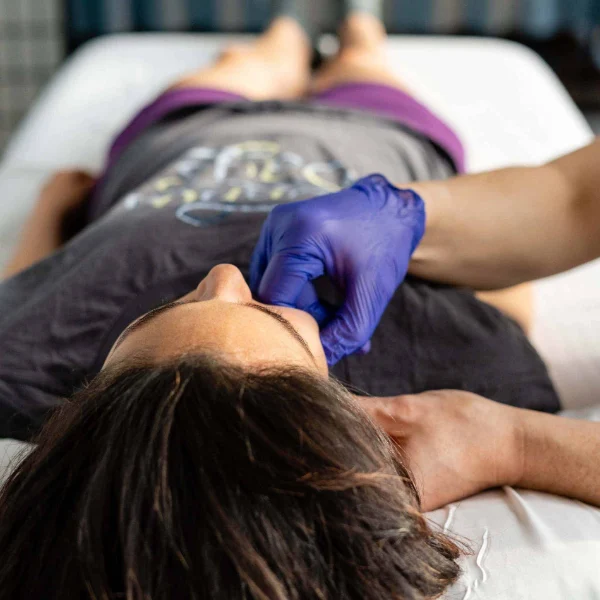Your jaw holds more than just words; it harbors hidden tension, stress, and discomfort. Our TMJ Massage goes directly to the source of these issues — offering relief that radiates from your smile to your soul.
Approximately 10 million Americans suffer from TMJ dysfunction. While TMJ massage is not necessarily its own treatment style, we believe it deserves its own category because it is so specific and the majority of people are not familiar with it.
TMJ dysfunction can be debilitating for some and merely annoying for others.
Symptom of TMJ dysfunction include:
- chronic headaches
- Grinding or clenching the teeth
- difficulty concentrating
- pain or tenderness in your jaw, temporomandibular joint, or around your ear
- Dizziness
- Locking of jaw joints so that opening or closing your mouth is difficult
- Difficulty or pain while chewing
While not everyone has these symptoms, we have found that jaw tension will often play a role in chronic head, neck and shoulder pain. When it comes to TMJD there are a variety of causes and we will do a thorough assessment of the jaw to determine how best to treat the issue. We use both external and intra-oral techniques in our TMJ massage program, depending on your comfort level and need. We understand that this type of therapy can be a little uncomfortable especially if you have not experienced it before. Please rest assured that we completely understand and you can take comfort in knowing we have the knowledge and experience to address the problem.
Our approach with our TMJ massage is that we always stay within your comfort level. Since the muscles treated in intraoral massage are some of the most ignored muscles in the body, they may be a little tender. Knowing this, your therapist will start with slow and gentle pressure and check in with you continuously to make sure that you are able to relax during the treatment. Even light methodical strokes, however, may feel intense. But you can expect quick relief after the periods of intensity.
After having the areas surrounding the TMJ massaged, the therapist may move on to massage your gums and roof of your mouth. In addition to treating jaw pain, intraoral massage also increases blood circulation in your gum tissue. Well-nourished gums are healthy gums, meaning they’re less likely to encounter aches and ailments.
The TMJ massage generally will not last the entire treatment time. As stated earlier TMJ Disorders often play a role in head, neck and shoulder pain so you can expect that your therapist will move on to the areas that are affected by the jaw pain so that those muscles can be released as well.
If you would like to know more about this therapy you can reach out to us via phone or email or you can book a free consultation with the therapist of your choice so that they can assess your jaw and let you know if Intraoral work is right for you.





